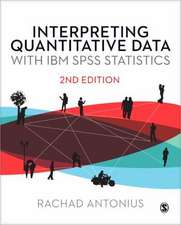Principal Components Analysis: Quantitative Applications in the Social Sciences, cartea 69
Autor George Henry Duntemanen Limba Engleză Paperback – 11 iul 1989
Din seria Quantitative Applications in the Social Sciences
-
 Preț: 306.08 lei
Preț: 306.08 lei -
 Preț: 270.02 lei
Preț: 270.02 lei -
 Preț: 270.25 lei
Preț: 270.25 lei -
 Preț: 274.06 lei
Preț: 274.06 lei -
 Preț: 270.29 lei
Preț: 270.29 lei -
 Preț: 304.51 lei
Preț: 304.51 lei -
 Preț: 304.83 lei
Preț: 304.83 lei -
 Preț: 313.80 lei
Preț: 313.80 lei -
 Preț: 305.60 lei
Preț: 305.60 lei -
 Preț: 304.77 lei
Preț: 304.77 lei -
 Preț: 306.14 lei
Preț: 306.14 lei -
 Preț: 273.46 lei
Preț: 273.46 lei -
 Preț: 275.42 lei
Preț: 275.42 lei -
 Preț: 277.33 lei
Preț: 277.33 lei -
 Preț: 305.05 lei
Preț: 305.05 lei -
 Preț: 271.10 lei
Preț: 271.10 lei -
 Preț: 270.63 lei
Preț: 270.63 lei -
 Preț: 305.05 lei
Preț: 305.05 lei -
 Preț: 304.51 lei
Preț: 304.51 lei -
 Preț: 305.28 lei
Preț: 305.28 lei -
 Preț: 270.40 lei
Preț: 270.40 lei -
 Preț: 305.60 lei
Preț: 305.60 lei -
 Preț: 304.77 lei
Preț: 304.77 lei -
 Preț: 306.14 lei
Preț: 306.14 lei -
 Preț: 306.34 lei
Preț: 306.34 lei -
 Preț: 305.40 lei
Preț: 305.40 lei -
 Preț: 306.41 lei
Preț: 306.41 lei -
 Preț: 304.77 lei
Preț: 304.77 lei -
 Preț: 305.60 lei
Preț: 305.60 lei -
 Preț: 304.51 lei
Preț: 304.51 lei -
 Preț: 269.91 lei
Preț: 269.91 lei -
 Preț: 270.40 lei
Preț: 270.40 lei -
 Preț: 269.91 lei
Preț: 269.91 lei -
 Preț: 289.18 lei
Preț: 289.18 lei -
 Preț: 287.82 lei
Preț: 287.82 lei -
 Preț: 316.12 lei
Preț: 316.12 lei -
 Preț: 288.96 lei
Preț: 288.96 lei -
 Preț: 316.71 lei
Preț: 316.71 lei -
 Preț: 314.98 lei
Preț: 314.98 lei -
 Preț: 317.26 lei
Preț: 317.26 lei -
 Preț: 314.60 lei
Preț: 314.60 lei -
 Preț: 289.95 lei
Preț: 289.95 lei -
 Preț: 289.18 lei
Preț: 289.18 lei -
 Preț: 315.36 lei
Preț: 315.36 lei -
 Preț: 314.98 lei
Preț: 314.98 lei -
 Preț: 314.38 lei
Preț: 314.38 lei -
 Preț: 316.33 lei
Preț: 316.33 lei -
 Preț: 316.51 lei
Preț: 316.51 lei
Preț: 288.96 lei
Nou
Puncte Express: 433
Preț estimativ în valută:
55.29€ • 57.88$ • 45.75£
55.29€ • 57.88$ • 45.75£
Carte tipărită la comandă
Livrare economică 07-21 aprilie
Preluare comenzi: 021 569.72.76
Specificații
ISBN-13: 9780803931046
ISBN-10: 0803931042
Pagini: 96
Dimensiuni: 140 x 216 x 6 mm
Greutate: 0.11 kg
Ediția:Will Be Reissue.
Editura: SAGE Publications
Colecția Sage Publications, Inc
Seria Quantitative Applications in the Social Sciences
Locul publicării:Thousand Oaks, United States
ISBN-10: 0803931042
Pagini: 96
Dimensiuni: 140 x 216 x 6 mm
Greutate: 0.11 kg
Ediția:Will Be Reissue.
Editura: SAGE Publications
Colecția Sage Publications, Inc
Seria Quantitative Applications in the Social Sciences
Locul publicării:Thousand Oaks, United States
Cuprins
Introduction
Basic Concepts of Principal Components
Geometrical Properties of Principal Components
Decomposition Properties of Principal Components
Principal Components of Patterned Correlation Matrices
Rotation of Principal Components
Using Principal Components to Select a Subset of Variables
Principal Components Versus Factor Analysis
Uses of Principal Components in Regression Analysis
Using Principal Components to Detect Outlying and Influential Observations
Use of Principal Components in Cluster Analysis
Use of Principal Components Analysis in Conjunction with Other Multivariate Analysis Procedures
Other Techniques Related to Principal Components
Summary and Conclusions
Basic Concepts of Principal Components
Geometrical Properties of Principal Components
Decomposition Properties of Principal Components
Principal Components of Patterned Correlation Matrices
Rotation of Principal Components
Using Principal Components to Select a Subset of Variables
Principal Components Versus Factor Analysis
Uses of Principal Components in Regression Analysis
Using Principal Components to Detect Outlying and Influential Observations
Use of Principal Components in Cluster Analysis
Use of Principal Components Analysis in Conjunction with Other Multivariate Analysis Procedures
Other Techniques Related to Principal Components
Summary and Conclusions
Descriere
For anyone in need of a concise, introductory guide to principal components analysis, this book is a must. Through an effective use of simple mathematical-geometrical and multiple real-life examples (such as crime statistics, indicators of drug abuse, and educational expenditures) -- and by minimizing the use of matrix algebra -- the reader can quickly master and put this technique to immediate use.














